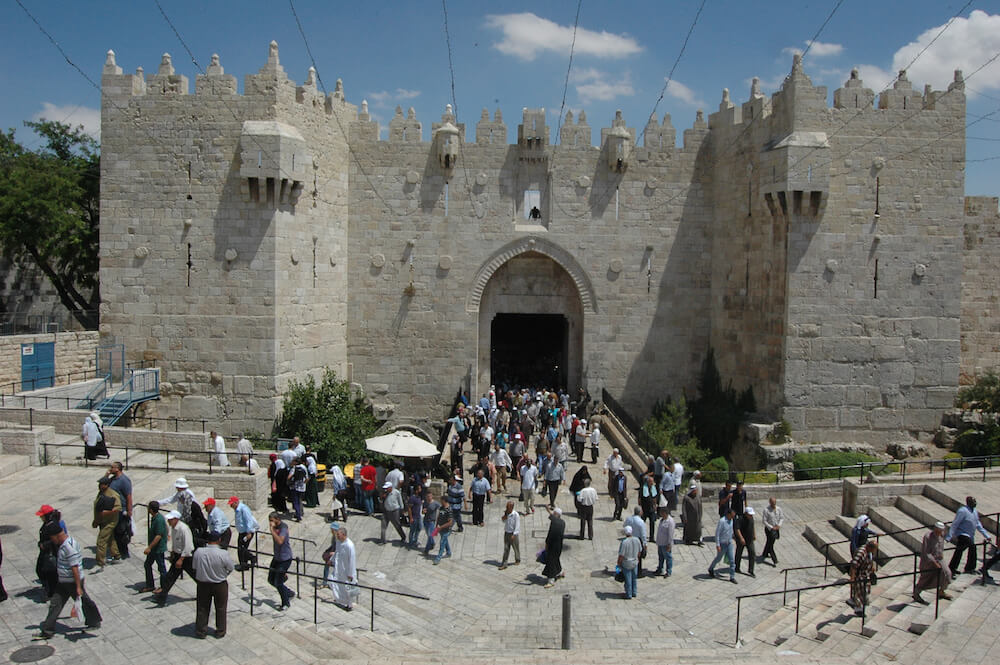As Friday Muslim prayers closed yesterday afternoon in Jerusalem, Palestinians from the West Bank unfamiliar with the Old City found their rides home by way of loud speakers. “Hebron and Bethlehem, to the station on the right,” a voice blared to a group of worshipers.
Last month Israel issued an easing of travel restrictions for West Bankers entering Jerusalem during the month of the Islamic celebration of Ramadan. But around half of the travelers expected just a week ago ending up making it to the al-Aqsa mosque yesterday.
Many were prevented from entering Jerusalem after Israel ordered a general closure of the West Bank and Gaza from Friday through Sunday, following a security cabinet meeting convened by Prime Minister Benjamin Netanyahu.
Netanyahu imposed measures in the wake of the killing of four Israelis in an attack in Tel Aviv earlier this week. The hometown of the two shooters, Yatta in the occupied southern West Bank, was closed-off by Israeli forces hours after the killings.
Police spokesperson Luba Samri said yesterday, the general closure “did not have a comprehensive effect on the passage of Palestinians for Friday Ramadan prayers at the al-Haram al-Sharif,” the religious complex in Jerusalem.
Women of all ages could enter the holy sites without showing any identification, as well as men over the age of 45 and children of all gender aged 14 and under.
Back in Jerusalem, aftershocks of the slayings were felt on the street.
Rami Zanadi, a worker for a mini-bus company, pointed to a parking lot, remarking on the thin crowds. Even though Palestinian women and children from the West Bank could enter under the relaxed holiday rules, noticeably, there were few males walking to and from the mosque.
“The situation is good, but it’s not enough. Today is Friday, the first Friday of Ramadan, and usually it is crowded with people coming, but there is not many people here compared to what I usually see,” Zanadi said.
“Look, there’s not a lot of people,” he added, before running off to search for potential passengers.



Palestinians from the West Bank were allowed to enter Jerusalem via Qalandia checkpoint. Groups of volunteers in neon vests passed out fans to women and children.
Raed Hamadan, 53, was wore a green scouts uniform with a matching beret as he directed cars away from and pedestrians into the military crossing. Vehicle traffic was closed for the day with the exception of ambulances. In their place scores of women walked freely through the checkpoint’s hangar, and exited into Jerusalem.
Israeli border police were deployed throughout the area, but did not interact with the Palestinians. No one was asked to present their ID card, or made to explain where they were going.
“Today I was here from 6 o’clock in the morning,” said Hamadan. “We are here helping the cars, and the people because some people are sick and some people are tired, you know some problems happen. We solve—we try to solve their problems.”
Hamadan has volunteered for 35 years with the Qalandia refugee camp branch of the Islamic scouts, a youth and marching band group. “I like this kind of donation, to help people. The main thing with scouts is to help people with anything we can do.”
“It is a very bad situation. We are not feeling that people can go to practice their religion. I know that it is because of what happened in Tel Aviv,” said Hamadan, referencing the attack on Wednesday.
“At this time of year there is supposed to be thousands of people coming and going. It’s empty,” he said.
In recent years when violence between Israelis and Palestinians lulled, Palestinians from the West Bank were allowed to walk through this checkpoint into Jerusalem during Ramadan, without presenting any identification.
Once on the other side of the wall and army crossing, and after a 20-minute bus ride, thousands of Palestinians poured through the narrow stone alleyways towards al-Aqsa mosque. In the afternoon shopkeepers prepared displays of candies, pastries and toys in anticipation of customers. Ramadan is the main shopping season for Palestinians.
Chris Habsh, a college student who said his family owns the one only Christian business in the Muslim Quarter, marveled at the increase of police deployed. “Before the stabbings there were no policemen, you just go and walk,” he said referencing nine straight months of increased tensions between Israelis and Palestinians.
Since last October Palestinians killed at least 36 Israelis in attacks—including the shootings in Tel Aviv—and Israelis killed more than 190 Palestinians.
Still, the mood was calm if not joyful for the Muslim holiday. Habsh was surprised by the placid atmosphere. He anticipated the situation could change at any moment. Since 2014, Habsh said the Old City has been volatile, and scuffles quickly escalate into confrontations with the Israeli military.
“Before the stabbings there were no policemen, you just go and walk,” he said, “I hope nothing will happen here now. Two years ago during the war with Gaza everything here was closed. As you can see it’s hard for Muslims because they don’t eat, but although they come and pray.”


